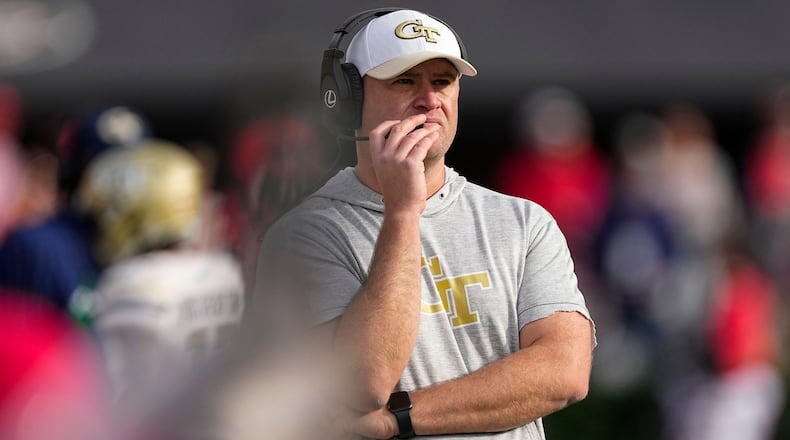Over several nights in January, when Brent Key returned to Georgia Tech’s football offices after making recruiting visits to high schools, he got to work in his office. It was not necessarily phone calls with recruits or meetings with his staff that brought him back to the spacious room overlooking Grant Field, but a demolition project.
Key’s office is ready to be renovated, thanks in no small part to Key personally bringing down dark-wood bookcases, cabinets, ceiling panels and parts of the walls. Tech athletic director J Batt hired a football coach when he signed Key to be Tech’s 21st coach; he didn’t know he was getting a sub-contractor as part of the deal.
“I just like doing (stuff) with my hands,” Key said in an interview with The Atlanta Journal-Constitution. “You have a tough day or a long day, you come in, you get a sledgehammer and knock the crap out of things. It was kind of therapeutic.”
Key spoke this week, taking the interview in a rare free moment from a schedule that has been filled with helping with the Yellow Jackets’ winter workouts and meetings with offensive and defensive staff as they put their respective schemes together and the recruiting staff to strategize on the assembly of the signing classes for 2024 and beyond.
To his right stood a bare wall of sheets of plywood where a floor-to-ceiling bookcase once stood. A few electrical outlets, wiring and conduit poked through openings in the wall. Quarterbacks coach Chris Weinke, director of player development Anthony Parker and director of football operations Josh Thompson also pitched in with the demolition, Key said.
“Honestly, why I did it is because, throughout the month of January, in recruiting, I wanted the kids to see progress,” Key said. “I wanted them to see progress in what was happening, that actually things were moving and taking place. So it was able to tell a good story with recruits. And then I figured I could save a couple thousand dollars in sweat equity. It’s pretty cool, though, that you feel like you have some sweat equity in something.”
Credit: Ken Sugiura/The Atlanta Journal-Constitution
Credit: Ken Sugiura/The Atlanta Journal-Constitution
Key is in the third month of this rebuild, engaging in some aspects of it on a literal level. As he shared details of his day-to-day oversight of the program, at least two things seemed clear. One is that while he had the advantage of serving as interim head coach for the final eight games of the 2022 season, Key still is in the process of making the program his own. Another is that Key has been ready for this opportunity.
Key’s days end, for example, watching television with wife, Danielle, watching “The Tonight Show.” When host Jimmy Fallon finishes his monologue, that’s Key’s signal to go to bed. That’s preceded by calls and texts with recruits and, among other things, honing job descriptions for his 43 staff members. He finishes the day typing up notes for the staff for the next day. His daily notetaking includes preparing the agenda for the staff meeting and a recap of the day.
“I keep those in files day by day throughout the year so the plan is to be able to look back a year from now and (check on) what happened on this day, what’d I miss, what do I have to go through and redo,” Key said.
It was a practice he learned from two former employers known for their attention to detail, Alabama coach Nick Saban and former Tech (and Central Florida) coach George O’Leary.
“When you’re around guys like that, you kind of pick up the tricks of the trade, and taking so many notes over the course of the years with those guys, I was able to go back and see,” Key said.
There have been a lot of notes in preparing to someday be a head coach.
“Brent was always a great note-taker,” O’Leary said in a phone interview this week.
Key can trace his preparations to be a head coach to 2009, when he was in his fourth year of coaching, serving as the offensive line coach at Central Florida for O’Leary.
“I woke up on a Saturday morning and drove to Target and bought a notebook,” he said.
Having observed another team, he decided that when he became a head coach, he would start practices with board drills, where an offensive and defensive player line up across from each other and try to drive the other backward. Ironically, the NCAA banned the drill in 2021.
“First thing I ever wrote down, I actually never can do,” he said.
The notes and plans kept accumulating and have been put into full effect. As he has put together his staff, Key has been mindful of the mix of personalities, strengths and weaknesses and also that he has work for each staff member to do.
“Probably the biggest fear that I had in the beginning was building a staff out, and they all split up the same work,” he said.
His approach was to conceptualize a smaller staff and create a workload for each member. From there, create additional work and additional positions.
“Because I didn’t want to have a certain amount of work and then you hire 20 more people, and it’s just the same work being done, just less by each person,” he said.
Job descriptions and assigned roles are important to Key.
“Because if you don’t have job descriptions, if you don’t define people’s roles, you can’t hold them accountable for anything,” he said. “So to be able build the staff that way, to be recruiting- and coaching-directed, that was important to me.”
His staff has some differences in titles from Collins’. He has a director of high school relations (former Blessed Trinity coach Tim McFarlin). One of the new assistant strength coaches, Byron Jerideau, has “accountability” as part of his title. Key added the title of co-offensive coordinator to Weinke’s role, also making new linebackers coach Kevin Sherrer co-defensive coordinator. The titles aren’t mere résumé fillers. In an interview with ACC Network in January, Key said that Weinke and Sherrer will have added administrative duties, help coordinators Buster Faulkner and Andrew Thacker manage recruiting for their units and have greater responsibility in practice.
Creating job titles, taking notes and leading meetings are not the most obvious duties filled by a college football head coach, but they’re the ones that occupy much of Key’s days at this point as he tries to fulfill a vision he has mapped out for more than a decade.
“I hope I never lose that feeling of wanting to make things better,” he said. “At the same time, I’m very conscious of creating a routine and a schedule for not just myself, but more importantly, for my staff and then the players. That, to me, is the most important thing.”
And, one of Key’s mentors would say, it’s an important part of the job. O’Leary said that for a head coach, the split between on-field responsibilities and everything else is 60/40.
On-field success “is the ultimate goal, but there’s a lot more pieces to the puzzle besides the practice field that have to be filled in,” he said.
Key’s goal is for the renovated office to be completed by April 15, in time for recruits coming to campus for the spring game that day. As the head coach’s office often is the last place that recruits go on a visit to campus, he wants it to be a place that makes an impression. His vision is for it to have a video screen to show off plans for the renovated Edge Center. He wants it to have the sleekness of an Apple store, he said, but also have industrial, blue-collar touches.
If renovators need an extra hand, they won’t have to look far.
“If I wasn’t a football coach, I probably would have been a construction guy or something like that,” Key said. “That’s why I came to Georgia Tech. I thought I wanted to be an engineer, a mechanical engineer.”
It may not be what Key might have imagined leading as an undergraduate, but it’s a building project nonetheless.
Credit: Jason Getz / Jason.Getz@ajc.com
Credit: Jason Getz / Jason.Getz@ajc.com
Credit: Jason Getz / Jason.Getz@ajc.com
Credit: Jason Getz / Jason.Getz@ajc.com
About the Author
Keep Reading
The Latest
Featured





